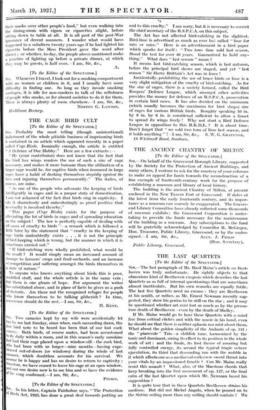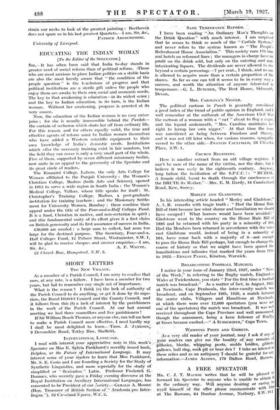THE LAST QUARTETS [To the Editor of the SPECTATOR.] SIR,—The
last paragraph of Mr. Basil Maine's article on Beet- hoven was truly unfortunate. He rightly objects to that obnoxious kind of Beethoven exegesis which describes the last Quartets as so full of internal questionings that are sometimes almost inarticulate. But his own remarks arc equally futile. The last five Quartets need no excuse : they arc Beethoven at his zenith, or rather, as Mr. Ernest Newman recently sug- gested, they show his genius to be still on the rise ; and it may be questioned whether art ever lost so much as by the prema- ture death of Beethoven—even by the death of Shelley.
If Mr. Maine would go to hear these Quartets with a mind free from critical clichés and with the music in his hand, even he should see that there is neither aphasia nor -mist about them. What about the golden simplicity of the Andante of op. 131 : the " piacevole " Trio—a childish tune, harmonized by the tonic and dominant, owing its effect to its position in the whole work of art : and the finale, its first theme of amazing but fully controlled energy, its second the typical tragic octave ejaculation, its third that descending run with the wobble in it which affects one as a mediaeval corkscrew sword thrust into your vitals by an impassioned fanatic ? Can Mr. Maine really resist this assault ? What, also, of the Maestoso chords that keep breaking into the first movement of op. 127, or the final calm of the last Quartet upon which Mr. Newman based his supposition ?
It is quite true that in these Quartets Beethoven strains his medium. But did not. Michel Angelo, when he poured on to the Sistine ceiling more titan any ceiling should contain ? We
strain our necks to lOok at the greatest painting : Beethoven
does not spare us in his last greatest Quartets.—I am, Sir, &c.,
University of Liverpool. PATRICK ABERCROMBIE.































































 Previous page
Previous page